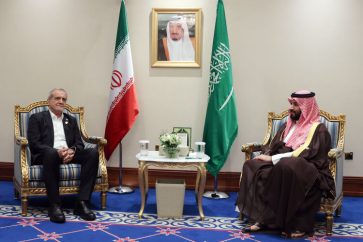As Saudi Arabia struggles to rebut accusations that Crown Prince Mohammad bin Salman was complicit in the grisly killing of a Saudi dissident, ‘Israel’, the United Arab Emirates and the prince’s other allies across the region are starting to worry that damage to him could upend their own plans and priorities, according to an article published by the US newspaper The New York Times.
NYT article considered that the ascendance of bin Salman in Saudi Arabia was a boon for ‘Israel’ as he sought to push back against Iran, cared little for the Palestinian cause, and was seen as someone able to impose the Trump ‘peace’ plan on the Palestinians.
“And although Saudi Arabia still had no formal diplomatic relations with ‘Israel’, the young prince spoke openly of the countries’ common interests.”
The article maintained that for ‘Israel’, accusations that the crown prince ordered the killing of Jamal Khashoggi have already had an effect, analysts said, effectively freezing the push to build an international coalition against “Iran’s regional influence”, the top priority for Prime Minister Benjamin Netanyahu.
“Saudi Arabia’s shifting responses to the accusations have hindered its efforts to contain the story. And as each new Turkish revelation has undercut the latest Saudi explanation, the cumulative effect has been a severe blow to the reputation of the kingdom and of Prince Mohammed, known by his initials as M.B.S.”
“What we are seeing in the region are expressions of loyalty to Saudi Arabia, but they mask real concerns among Saudi Arabia’s close allies about the viability of the current regime and about how its behavior is going to affect the region,” NYT article quoted Lina Khatib, the head of the Middle East and North Africa program at Chatham House, as saying.
According to NYT, Turkey has benefited from Khashoggi case, and the country’s Islamist president, Recep Tayyip Erdogan, has used the issue to help erode the reputation of bin Salman.
Source: The New York Times




